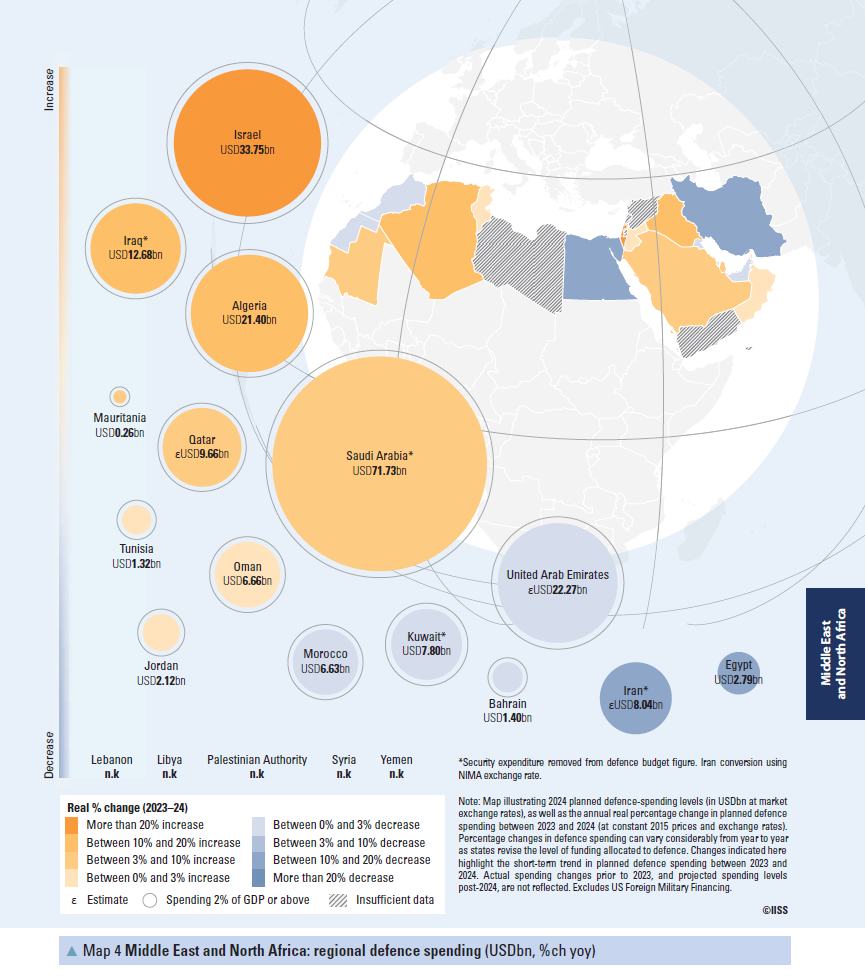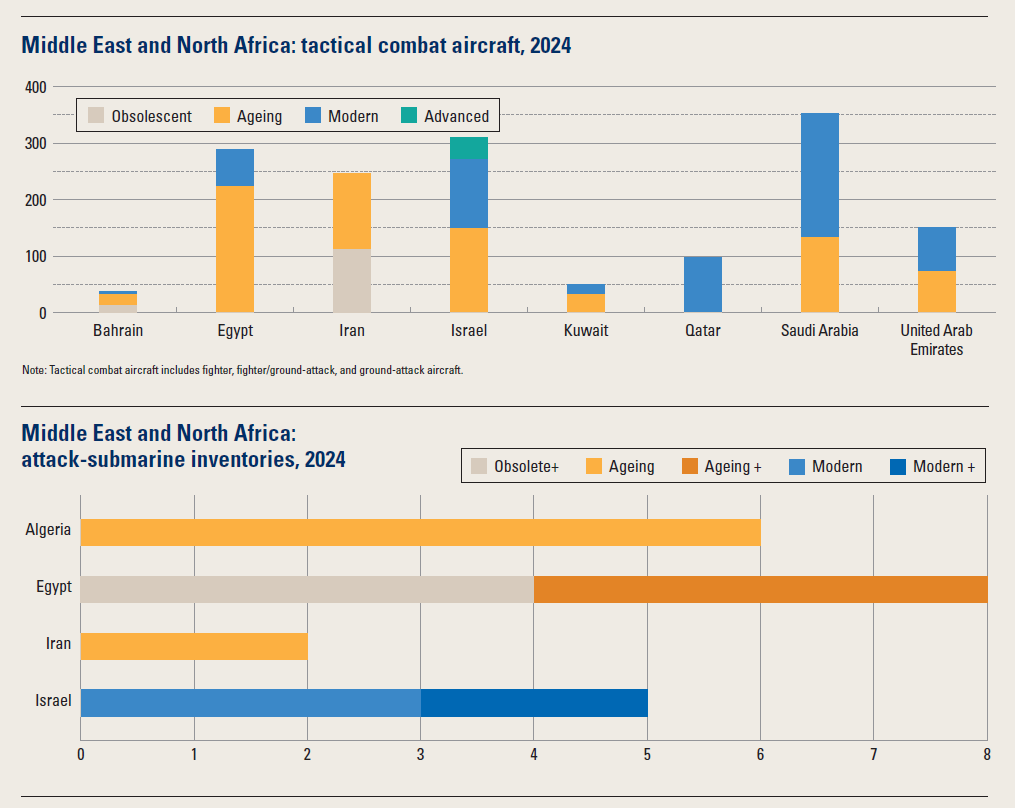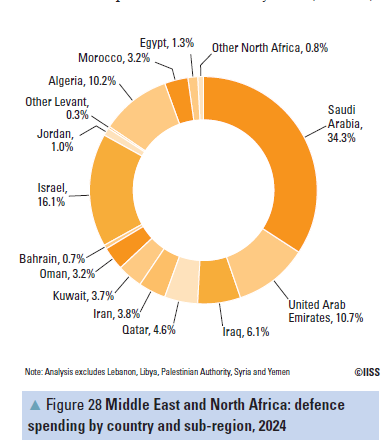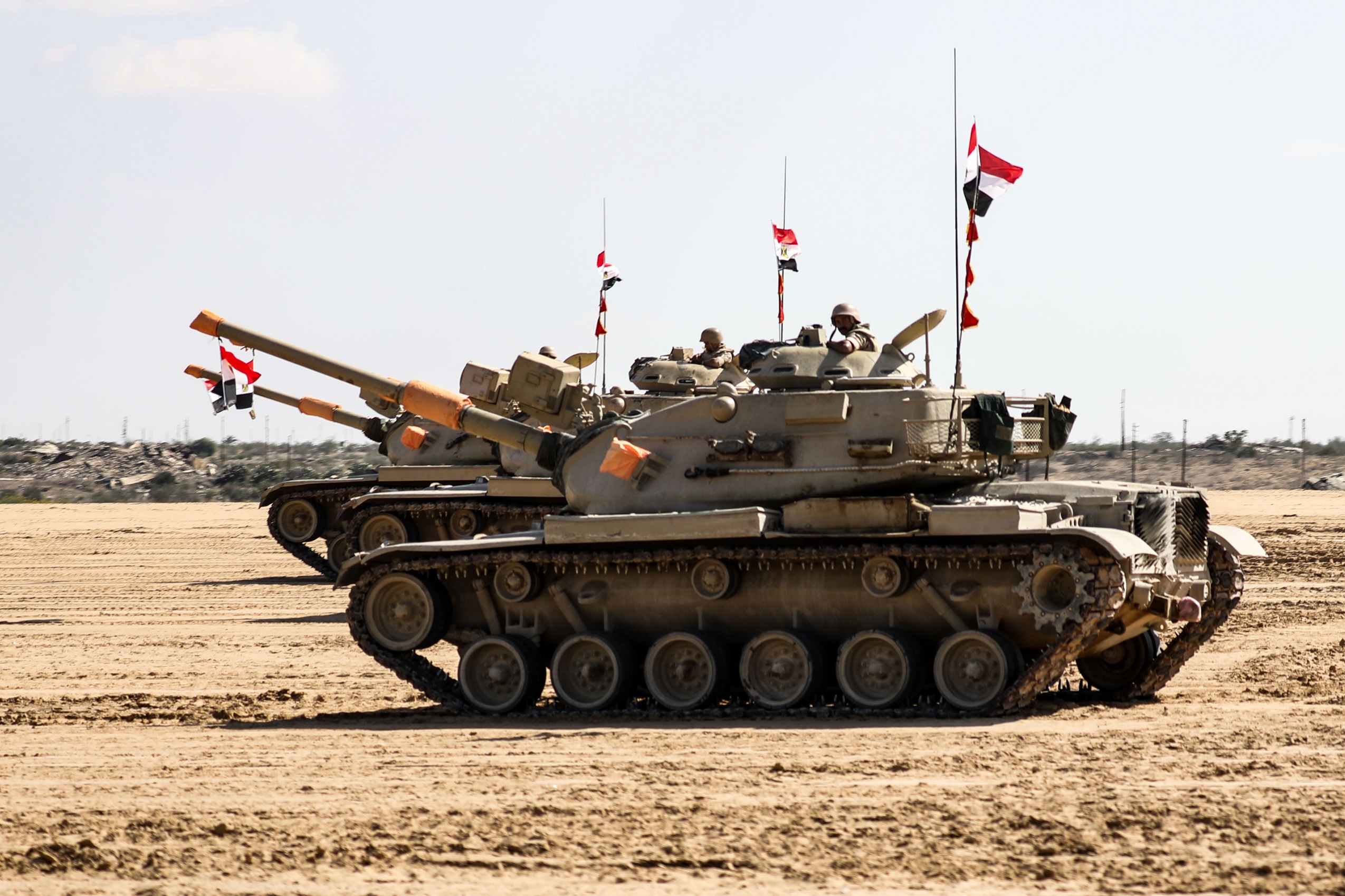Publications
INSS Insight No. 1968, March 26, 2025
This article aims to address the recurring questions recently raised in Israel regarding Egypt’s expanded military presence in the Sinai Peninsula and near the international border with Israel, alongside its significant military buildup during the years of President el-Sisi’s rule. Such discussions often emphasize a link between these two issues, with claims emerging that Egypt is preparing for a pre-emptive war against Israel. Egyptians are not indifferent to such pronouncements, which have sparked critical discourse toward Israel and increased bilateral tensions during this sensitive period. This article will focus on Egypt’s self-perception as a major regional power, as well as the security challenges it faces. In conclusion, the article will stress the need to reduce tensions between Israel and Egypt, to preserve mutual commitment to the peace treaty, and to reaffirm peace through direct high-level dialogue, as well as public discourse in both countries.
Recently, questions have been raised in Israel—in the media, on social networks, and among researchers and experts—regarding the expanded Egyptian military presence in the Sinai Peninsula and near the international border with Israel, in addition to the significant buildup of the Egyptian army during the years of President el-Sisi’s rule. These discussions point to a connection between the two issues, suggesting that Egypt is heading toward a pre-emptive war against Israel. From this perspective, the activity is seen as preparation for a rapid manoeuvre and possibly a surprise attack. The Egyptians are not indifferent to these discussions, which have sparked critical discourse toward Israel and have increased tensions in bilateral relations during this sensitive period.
Alongside the discussion of the Egyptian military buildup and the potential challenge it may pose to Israel, it is necessary to examine it—particularly the reinforcement of forces in the Sinai Peninsula—against the backdrop of President Abdel Fattah el-Sisi’s overall perception of Egypt’s national interests, Egypt’s security doctrine, the central role of the military in advancing strategic objectives, and the place of Sinai within this complex and challenging context.
Egyptian Threat Perception and the Motives Behind the Military Buildup
President Abdel Fattah el-Sisi was elected in 2014 following a series of historic and dramatic events that took place in Egypt starting on January 25, 2011, when masses took to the streets to protest against President Hosni Mubarak, ultimately leading to his removal from power. These events became etched as an ethos into the collective memory, an important aspect of which is Egypt’s struggle over its identity in the face of internal forces—primarily the Muslim Brotherhood. Moreover, el-Sisi is perceived, even during his time as Minister of Defense, as having saved Egypt from collapse and ruin. The president often reminds the public of this, especially during memorial days and national events. During the rule of the Supreme Military Council following Mubarak’s fall—and even more so after el-Sisi came to power in 2014—it was military force that maintained law and order in the country and along its borders, preventing Egypt from undergoing the kind of disintegration seen in other Arab states. Additionally, the military’s policy was to avoid harming civilians, except those identified as attackers affiliated with the Muslim Brotherhood. In practice, the army assumed the role of the police—maintaining law and order—after the police had been overwhelmed by the angry masses and later underwent reconstruction and rehabilitation. Thus, the Egyptian military regained public legitimacy as the protector of the nation, and public esteem for it was preserved. President el-Sisi and senior military officials believe that part of the vision for the new republic is that the military must also be rebuilt and its capabilities enhanced to meet the demands of national defense.
At the beginning of the previous decade, Egypt faced significant security challenges—the Muslim Brotherhood as an internal enemy, and terrorism in large parts of northern Sinai. In addition, major security threats developed along all of Egypt’s borders: the civil war in Libya led to the collapse of the state, including the loss of control over large weapons depots, which were looted and their contents smuggled into Egypt itself and into Sinai. In Sudan, under the rule of al-Bashir, there were smuggling operations in the shared border area and terrorist activity, some of it aided by Iran. Instability in Sudan has persisted, and in the past two years, a violent civil war has erupted there, leading to complete loss of governance and the movement of additional waves of refugees into Egypt. Along the border with the Gaza Strip, the Egyptian army has in recent years been forced to combat Hamas capabilities including hundreds of tunnels that fuelled terrorist activity in Sinai.
In 2012, while Egypt was dealing with terrorist threats in the Sinai Peninsula as well as threats to its own internal security, it became entangled in a political and even ideological conflict with the US Obama administration, due to the clash between the Muslim Brotherhood with the state and the military. The American administration believed that after the fall of Mubarak’s regime, free elections should be held to reflect the will of the people. With the election of the movement’s representative, Mohamed Morsi, as president, the Egyptian public was divided between supporters and opponents. During his turbulent year in office, protests, demonstrations, and incidences of severe violence increased, until in June 2013 then-Defense Minister al-Sisi compelled President Morsi to hold a referendum. Morsi’s refusal led to his removal from the presidential palace by the military under al-Sisi’s directive. This development prompted the Obama administration in August 2013 to temporarily halt military aid to Egypt (U.S. law requires the suspension of most types of aid to any country where the government has been overthrown in a military coup). This meant that essential aid to the Egyptian army, including F-16 aircraft, missiles, Apache helicopters, and spare parts for them, was stopped, even though the helicopters were necessary for fighting terrorist cells in Sinai.
Against this backdrop, an understanding was formed that the army must be and appear strong, large, modern, and well-equipped. In the Egyptian consciousness, the understanding was imprinted in light of the Iraqi experience following the American invasion in 2003, when the army was dismantled and the Iraqi state changed its character. Another understanding formed by President al-Sisi was that Egypt cannot rely on the United States as the primary source of equipment, but rather must diversify its sources of military procurement. This understanding received further validation with the fall of Bashar al-Assad’s regime and the rapid collapse of the Syrian army.
Indeed, in recent years Egypt has purchased weapons from various countries, including Rafale aircraft from France, and submarines and frigates from Germany. It considered purchasing MiG-35s from Russia but apparently withdrew, though it did acquire helicopter carriers from Russia, as well as combat systems for the air force and navy from Italy. In addition, Egypt conducts joint exercises annually with various armies from around the world. The acquisitions and exercises hold great importance in the relationships Egypt maintains with a number of countries, as they support its regional and international positioning as a state with capabilities and diverse, sophisticated diplomatic ties. After all, a country perceived as aggressive and unstable, that does not maintain a balanced policy, would not receive such cooperation, certainly not from the leading European countries.
During al-Sisi’s presidency, and especially during his second term, Egypt upgraded its military presence along all its borders. An example of this is the upgrade that began in 2019 of the air force base in Sidi Barrani, near the western border with Libya. In July 2021, an upgraded naval base was also inaugurated in the western arena on the northern coast near the Libyan border.
The military buildup also has domestic significance—it is presented to the public as reinforcing the strong and powerful image of the army. In addition, it is important for maintaining the satisfaction and loyalty of the senior officers who draw upon the army’s status and image.
It is important to examine the process of the Egyptian army’s military buildup in relation to other armies in the Middle East. Four of the ten largest arms importers in the world during the years 2020–2024 are countries in the region: Saudi Arabia, Qatar, Egypt, and Kuwait. Most of the weapons originate from Western sources: more than half from the United States, 13 percent from Italy, and 10 percent from France. According to a report by the research institute SIPRI from March 2025, Middle Eastern countries reduced arms imports during the years 2015–2024 by an average of twenty percent—see Figure 1.
Egypt reduced its acquisitions by 20 percent in the years 2023–2024. Saudi Arabia, the largest purchaser during this period, increased its acquisitions in those same years by 10–20 percent. Israel increased its acquisitions by more than 20 percent.
Figure 1: The military buildup of the Egyptian army in relation to other armies in the Middle East

It’s also worth noting Egypt’s acquisition of strategic platforms—fighter jets and submarines—in 2024 in relation to other Arab countries. See Figure 2. Egypt’s acquisitions can be explained by the need to replace aging platforms.
Figure 2: Fighter jet acquisitions in the Middle East, 2024

Figure 3: The percentage of Egyptian acquisitions out of total acquisitions made in the Middle East in 2024

Development in Sinai and military expansion in the peninsula
During his first term as president (2014–2018), al-Sisi formulated the vision of a New Republic for the rehabilitation and development of the state. This vision addressed all areas of life and the economy, with an emphasis on developing infrastructure and services for all citizens, including in the periphery. The implementation of this vision through the national development plan accelerated during his second and current, third term.
In the Sinai Peninsula area, development was carried out to realize a series of national, economic, and security interests. According to a statement by the Egyptian Cabinet’s Information Center from October 2020, since 2014 Egypt had invested 600 billion Egyptian pounds, approximately 60 billion shekels, in Sinai to pave roads, lay railway tracks—the first line of the high-speed electric train connecting the Red Sea to the Mediterranean Sea, a sort of land-based Suez Canal—,digging tunnels beneath the Suez Canal, urban projects, water desalination and wastewater treatment facilities, as well as agricultural, industrial, energy, and tourism projects. The development enterprise is an expression of a new geo-strategic vision for Sinai, aimed at creating continuity between the peninsula, the delta, and the Nile Valley—in other words, turning the peninsula into an economic land bridge between Asia and Africa. The Suez Canal was upgraded by opening an additional canal in a segment parallel to the existing one, of about 70 km long. Along it, the Suez Canal Economic Zone—SCZONE—was established at a total cost of 18 billion dollars, including four industrial zones, six seaports, and hundreds of industrial and logistics facilities. The entire area provides 100,000 jobs. As part of the development in the Sinai Peninsula, special emphasis was placed on building infrastructure for the Bedouin residents of Sinai, reflecting a shift in approach toward them, viewing them as part of the country’s social-national fabric, and expressing appreciation for their assistance in eradicating terrorism in Sinai over the past decade.
The peace treaty between Israel and Egypt includes several annexes, the first of which is the protocol regarding Israeli withdrawal and security arrangements. The text of the treaty reflects its essence—an end to the war and the establishment of peace, in exchange for a full Israeli withdrawal from the Sinai Peninsula and the restoration of Egyptian sovereignty over Sinai. Yet the Egyptian sovereignty that emerged in Sinai by virtue of the peace treaty is not complete. Commentators and journalists have written about this over the years, and the issue repeatedly arises in connection with the annual Egyptian national holiday, Sinai Liberation Day, April 25, the day on which Israel withdrew its forces from Sinai, except for Taba, in 1982.
Egypt’s war on terror in the Sinai Peninsula at the beginning of the previous decade was made possible after Israel acceded to Egypt’s request and, subject to the principles of the peace treaty and its military annex, agreed to allow more Egyptian soldiers into Sinai, effectively constituting a violation of the agreement. Israel first approved a violation in January 2011, that is, with the outbreak of the revolution against Mubarak’s regime, due to Egypt’s need to thwart smuggling through the tunnels from the Gaza Strip to Sinai by deploying 800 soldiers to the area. In 2011, a series of terrorist attacks against Israel began along the international border fence between the two countries. After an attack in August 2011, when terrorists opened fire on an Egged bus on Route 12, and again in August 2012, when terrorists seized a post and Egyptian armoured vehicles, forces and aircraft were deployed to Sinai in coordination with Israel. In 2015, Israel and Egypt formulated a coordination mechanism to approve Egyptian military activity in Sinai that exceeds what was agreed upon in the peace treaty—called “agreed activities.” The renewed approval granted by Israel was based on the assertion that these deviations were temporary and reversible. From time to time, there were deviations from the agreements, which caused tension in Israel until the issues were resolved to the satisfaction of both sides. The coordination task was entrusted to the bilateral military liaison channel, under the close supervision of the Multinational Force and Observers (MFO). This force was also subject to terror threats during the mentioned years, and there was an ongoing need to secure its presence and continued operation in the peninsula. However, the deviations included the construction of infrastructure, which is irreversible and may be understood as intended to establish the Egyptian army’s presence in Sinai while building offensive capability against Israel. These deviations are under constant review by all relevant parties.
Implications for Peaceful Relations with Israel
Egypt is committed to the peace treaty with Israel, in accordance with the strategic decision made by President Sadat. This is conveyed unequivocally to the relevant Israeli parties and is also stated publicly by President al-Sisi and other senior officials. In a speech delivered at the Arab League summit held in Cairo on March 4, the president said that the peace treaty between Israel and Egypt, which the countries reached in 1979, is a worthy example of turning hostility, war, and the desire for revenge into lasting peace and diplomatic relations. The commitment to the peace treaty effectively eliminates Egyptian motivation to initiate war against Israel. Egypt regained the Sinai Peninsula, and since then, Egyptian sovereignty has been maintained and respected by Israel, its eastern neighbour. Moreover, five decades of peace have allowed Egypt to channel its resources into economic development, which has become a central pillar of contemporary Egyptian policy. Egyptians are well aware of the consequences of war and the extensive destruction it entails. To be specific, the national vision that President al-Sisi has formulated and is advancing for Egypt could be destroyed in a few days of fighting with Israel.
The Egyptians repeatedly remind themselves and those around them of the heavy price Egypt paid for the Palestinian cause during the rule of Abdel Nasser. However, in their view, that era has passed; Egypt now prioritizes its own interests and welfare. “Egypt First”—as a continuation of the development vision outlined by President al-Sisi. Escalation with Israel would only occur if Egypt were to conclude that Israel poses a direct and concrete threat to Egyptian national security
Indeed, the attempt to identify motivation for military action against Israel outside the realm of bilateral relations leads inevitably to the Palestinian issue, which, as is often the case, could trigger escalation with Israel. It should be noted that during the months of war in the Gaza Strip, Egyptian military leaders and commentators emphasized the army’s readiness and willingness to defend the homeland, as Israeli actions during the fighting—along with official and other Israeli statements perceived as threatening to Egypt—raised concerns about a possible violation of Egyptian sovereignty in Sinai. Particularly concerning, and therefore met with strong opposition, was the possibility of Palestinian refugees moving from the Gaza Strip into Egyptian territory, whether as a result of the widespread destruction and loss of life in the Strip or due to an attempt to implement President Trump’s idea of the “voluntary migration” of residents, including to Egypt.
* * *
In conclusion, it is important to reiterate the need to preserve and emphasize the mutual commitment of Israel and Egypt to the peace treaty. This must be practiced through direct dialogue at the senior level between the two countries and also among the publics of both nations. In addition, the professional and thorough operation of military-security communication channels must continue, led by the Joint Military Committee and the professional bodies in both countries, as well as the activity of the Multinational Force for the purpose of monitoring and investigating developments in the Sinai region and clarifying all issues. Another important pillar that has always accompanied this relationship is the involvement and commitment of the United States and the international community, which regard Israel and Egypt’s peaceful relationship as a cornerstone of stability and peace in the region.



